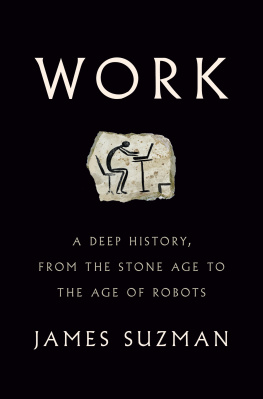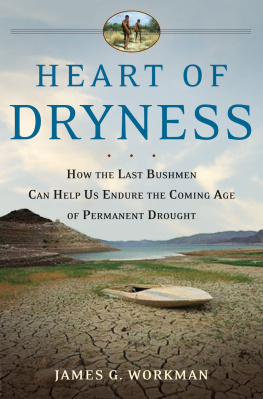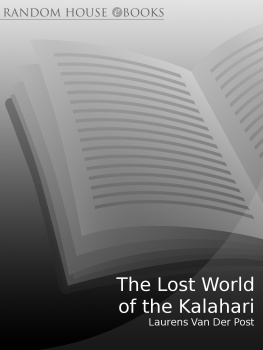There are too many peopleJu/hoansi, colleagues, friends, Namibian officials, family, and otherswho have helped one way or another in shaping the ideas presented in this book for me to thank them individually. To all of you, I hope that the book does sufficient justice to your assistance. Failing that, I will buy you a drink.
Others have helped in the immediate challenges of turning a series of disparate ideas into an actual book. Im especially grateful to Olivia Judson for assisting me to develop the initial proposal; Fleur de Villiers for her forthright advice; Michelle Fava for the wonderful maps and encouragement; and my parents for their help with the manuscript. Im also grateful to the editorial team at Bloomsbury, as well as my literary agency, Greene & Heaton in London. I also owe a debt of gratitude to Megan Laws, Adrian Arbib, Sheila Coulsen, and Paul Weinberg for granting me permission to use some of their beautiful photographs.
Finallyand even if some of them dont want my gratitudeI offer my eternal thanks to the many San who have not only tolerated my presence and nagging questions over the past twenty-five years, but who also embraced me as a friend and welcomed me as a neighbor.
This book is the result of nearly a quarter of a century working among southern Africas San peoples. It is the product of many close friendships forged over this period as well as many interviews with and incidents involving people I know less well. In some instances, I have changed peoples names or disguised them in other ways to protect their privacy.
There are many other people whose thoughts and lives have shaped this book but whose individual stories are largely absent. None more so than my friend and mentor !A/ae Frederik Langman, who in 1994 eased me gently into the then unfamiliar and sometimes terrifying reality of the Omaheke Ju/hoansi. !A/ae is now the government-recognized chief of the Omaheke Ju/hoansi. I am proud to say that we still consider each other family. This book is dedicated to him and my many friends at Skoonheid Resettlement Camp in Namibias Omaheke Region.
Skoonheid Resettlement Camp, Namibia, Spring 1995
//Eng had busy hands. When she was not knitting, she fashioned intricately patterned jewelry from ostrich eggshells to sell to the white farmers, or ferreted around in the small garden she had planted in the sand behind her hut. If anyone here was going to persuade the desert to yield up a few vegetables despite the drought, it was //Eng.
Sometimes, when it was too hot to do anything but snooze in the shade, I would imagine what my Ju/hoan Bushman neighbors like //Eng would have become had they been born into my world. In these moments //Eng would be transformed into a snappily dressed entrepreneur, celebrated and envied in equal measure for her energy and success.
But instead she lived on a resettlement farm in eastern Kalahari, expended her energy on survival, and dressed herself in a patchwork of carefully reworked rags. She was one of thousands of Ju/hoansi whose ancestors had hunted and gathered in this part of the world from soon after the evolution of modern humans two hundred thousand years ago until the white soldiers, farmers, and magistrates appeared two generations agowith their guns, borehole pumps, barbed wire, and herds of cattleand claimed this desert for themselves. After this the Ju/hoansi and other Bushmen in this part of the Kalahari had no option but to work for white farmers if they wanted to survive. Now //Eng, along with around two hundred other Ju/hoansi who had been deemed superfluous by the white farmers, had been moved by the government to a newly established resettlement area on what until recently was a Kalahari cattle ranch.
Why did she work so much harder than the others in the resettlement camp? I wondered aloud when sitting with her one afternoon. And why was she always busy when most of the others were content to sit around waiting for the food aid, which we all knew was never enough and never arrived on time?
/Kunta, my boy, she said, addressing me by my Ju/hoan name, do you not know why? I thought that you were supposed to be clever.
I reminded her that she had spent most of the preceding year pointing out her surprise at my stupidity and so asked her to explain.
//Eng spoke fast. She fired out clicks and consonants like a Gatling gun. While at that time I had managed to master the basic clicks of !Kung, the language spoken by the Ju/hoansi Bushmen, I still struggled to speak it competently. The breathy aspiration, the shifting tones, the growly pharyngealization, the nasalization, and the glottal stops that made this one of the most phonemically sophisticated languages in the world contorted my tongue and teased my ear, so I asked her to explain in Afrikaans, a language that she and most other Ju/hoansi in this part of the Kalahari were fluent in by the time I started to work there in the early 1990s.
They are lazy! she exclaimed. They do not yet know that to live you now must work hard.
//Eng had the virtues of hard work drummed into her from an early age. Her parents struggled to adjust to farm life and parted ways when //Eng was a toddler, and her headstrong mother took her and her brother to stay on another farm. But soon after arriving there her mother died suddenly and inexplicably. //Eng and her brother were then sent to another farm to be playmates for a white farmers two children, who led lonely lives when not away in the capital at school. The farmer was kind but intolerant of idleness. This didnt bother //Eng. She had plenty of energy and, when not playing with the children, performed various chores around the house.
I was very neat. Very organized, she explained. I cleaned, polished the floors and furniture, dusted, washed clothes, and did sewing and ironing. And because I worked so hard and so well, I was given old clothes and shoes and never went hungry. /Kunta, it was there that I learned to work and to understand how white people lived.
But these Bushmen here still think like the old people who were happy to wait for the manketti nuts to fall from the trees or for a hunter to have good luck and kill a big kudu or an oryx. She laughed at the thought of a belly full of game meat before grabbing the half-smoked cigarette from my outstretched hand.
She sucked down what was left of the cigarette in a single sustained drag, spat, and, with smoke streaming out of her nose, continued. But people here are happy to wait. They think the new government will look after them. That there will always be food. Yet they complain, complain, complain about being hungry today and fight each other and complain more even when the food comes because it is not enough. But still they do nothing because they think that those food trucks will come again. But the trucks wont always come, /Kunta. One day they will all die from hunger. You will see. But I will work to live, /Kunta. This is what I learned from the whites.
I thought //Engs characterization of her neighbors was unfair. Not all sat around waiting indigently for the government to deliver emergency food rations. Like people everywhere, the Ju/hoansi at Skoonheid couldnt abide boredom or the sense of powerlessness that came from being dependent on others. For many, alcoholwhen availableprovided some respite. It made them forget their pain and their hunger even if it was just as likely to unleash violence as give them pleasure. Some snuck onto the white farms to hunt warthogs, small fowl, springhares, and larger antelope if they were lucky. Some became accomplished stock thieves. Others, nervous of the farmers guns and dogs, diligently traipsed the wide gravel roads that cut through the desert offering their labor as cattle minders or fence builders. But there were few opportunities for them. They had little option but to sit and wait.
//Eng would have scolded me for thinking it, but I also had a different view of why her lazy neighbors were seemingly content to sit and wait while their stomachs rumbled. To me their apparent indigence was neither a consequence of laziness nor even entirely a consequence of their ill fortunes. Instead I saw in their behavior a trace of how their parents and grandparents had lived before the white settlers came, a way of life that shines a new light on an ever more urgent and perplexing problem that was first raised by the economist John Maynard Keynes at the height of the Great Depression, a time when in this part of the Kalahari manketti nuts still fell from the trees and kudu bearing their giant spiral horns walked gamely into hunters paths.
Next page




